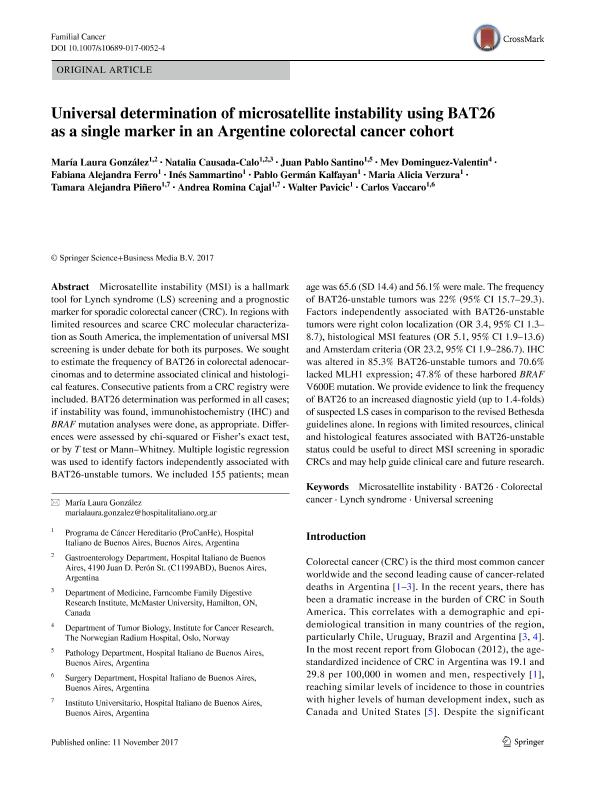Artículo
Universal determination of microsatellite instability using BAT26 as a single marker in an Argentine colorectal cancer cohort
González, María Laura; Causada Calo, Natalia; Santino, Juan Pablo; Dominguez Valentin, Mev; Ferro, Fabiana Alejandra; Sammartino, Inés; Kalfayan, Pablo Germán; Verzura, Maria Alicia; Piñero, Tamara Lejandra ; Cajal, Andrea; Pavicic, Walter Hernan
; Cajal, Andrea; Pavicic, Walter Hernan ; Vaccaro, Carlos
; Vaccaro, Carlos
 ; Cajal, Andrea; Pavicic, Walter Hernan
; Cajal, Andrea; Pavicic, Walter Hernan ; Vaccaro, Carlos
; Vaccaro, Carlos
Fecha de publicación:
07/2018
Editorial:
Springer
Revista:
Familial Cancer
ISSN:
1389-9600
Idioma:
Inglés
Tipo de recurso:
Artículo publicado
Clasificación temática:
Resumen
Microsatellite instability (MSI) is a hallmark tool for Lynch syndrome (LS) screening and a prognostic marker for sporadic colorectal cancer (CRC). In regions with limited resources and scarce CRC molecular characterization as South America, the implementation of universal MSI screening is under debate for both its purposes. We sought to estimate the frequency of BAT26 in colorectal adenocarcinomas and to determine associated clinical and histological features. Consecutive patients from a CRC registry were included. BAT26 determination was performed in all cases; if instability was found, immunohistochemistry (IHC) and BRAF mutation analyses were done, as appropriate. Differences were assessed by chi-squared or Fisher’s exact test, or by T test or Mann–Whitney. Multiple logistic regression was used to identify factors independently associated with BAT26-unstable tumors. We included 155 patients; mean age was 65.6 (SD 14.4) and 56.1% were male. The frequency of BAT26-unstable tumors was 22% (95% CI 15.7–29.3). Factors independently associated with BAT26-unstable tumors were right colon localization (OR 3.4, 95% CI 1.3–8.7), histological MSI features (OR 5.1, 95% CI 1.9–13.6) and Amsterdam criteria (OR 23.2, 95% CI 1.9–286.7). IHC was altered in 85.3% BAT26-unstable tumors and 70.6% lacked MLH1 expression; 47.8% of these harbored BRAF V600E mutation. We provide evidence to link the frequency of BAT26 to an increased diagnostic yield (up to 1.4-folds) of suspected LS cases in comparison to the revised Bethesda guidelines alone. In regions with limited resources, clinical and histological features associated with BAT26-unstable status could be useful to direct MSI screening in sporadic CRCs and may help guide clinical care and future research.
Archivos asociados
Licencia
Identificadores
Colecciones
Articulos(IMBICE)
Articulos de INST.MULTIDISCIPL.DE BIOLOGIA CELULAR (I)
Articulos de INST.MULTIDISCIPL.DE BIOLOGIA CELULAR (I)
Citación
González, María Laura; Causada Calo, Natalia; Santino, Juan Pablo; Dominguez Valentin, Mev; Ferro, Fabiana Alejandra; et al.; Universal determination of microsatellite instability using BAT26 as a single marker in an Argentine colorectal cancer cohort; Springer; Familial Cancer; 17; 3; 7-2018; 395-402
Compartir
Altmétricas



